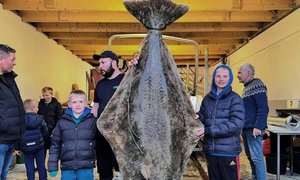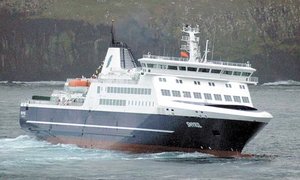By Bruce McMichael
Drilling in frontier areas such as offshore the Faeroe Islands is an expensive, nerve-wracking occupation fraught with economic uncertainty and personal danger, capable of giving jaded oil executives emotional highs and lows.
Today, despite high oil prices, companies are reluctant to splash out millions of dollars on risky exploration plays preferring to blame volatile markets and uncertain global political situation for holding back with the drill bit.
But, temptation to explore offshore Faeroes is expected to be put in front of oil companies at this year?s Faeroes Oil and Gas show where details of a new round are expected to be released, said local officials. As exploration success has eluded the explorers in the southeast corner of the island?s offshore waters, it is likely that attention will turn to the northeast.
The west of Shetlands region is vying for petroleum exploration cash with surrounding areas, including offshore Norway. Competition from the Nordic explorers is set to increase next year when Britain and Norway sign the first ever cross-border co-operation agreement between the two countries. British energy minister Brian Wilson says that £2bn of savings will be unlocked by treaty.
"Co-operation between the UK and Norway is now better than at any previous point in the history of the North Sea industry. It is particularly important that we should find ways of working together in the median areas around the territorial borders.?
This treaty could lead to further collaboration between neighbouring maritime countries in the region.
At the same time, keeping a close eye on future offshore UK licence rounds is an important weapon in the explorer?s armoury. The UK will open its 21st licence round next year but it is unlikely to include any acreage near the Faeroes.
The 21st round is likely to be a mopping up exercise mature areas not taken up in the previous 20th round and a batch of assets in the gas prone southern North Sea basin.
Acreage in the West of Shetlands and east of the Faeroes Islands will be included in a single round at a later date, said a government oil and gas official. ?We included acreage close to the Faeroes in the 19th licence round. We need to do more environmental work in the area before we can open acreage there once more,? he said.
A department of energy spokesman added: ?We are still working on the licence round and expect to make an announcement early next year.?
Fears that existing local industry, in particular the fishing industry, will be adversely affected by the influx of petrodollars are also a major worry, but one with careful management need not cause undue concern.
The potential negative impacts of an oil industry on fishing is now widely perceived as being negligible, as the commercial activity is focused on the shallow shelf areas around the islands while the oil industry is looking for its natural riches under deeper waters.
Faeroese economic life could be impacted by the oil industry, said researchers at Menas Associates, as the oil business could suck skilled engineers into employment on the offshore larger support vessels and away from the fishing fleet. But, ?increased economic activity in the islands resulting from the development of a new industry could provide employment opportunities for younger age groups?.
In the UK, an increasing cause of friction between the fishing industry and the energy sector is the development of offshore wind farms, such as proposed by Canada?s Talisman Energy offshore Scotland. While the impact on fish spawning and migration on constructing the huge wind turbines in shallow offshore water has yet to be fully understood, the wind industry is working closely with colleagues in the fishing sector to minimise any adverse impact.
But for the oil and gas sector in the UK, Michel Contie, president of the United Kingdom Offshore Operators Association (UKOOA), said recent research carried out by the group, ?indicates that the UKCS is at a critical point in terms of its international competitiveness because of the maturity of the basin.?
The report also noted that increased production volumes do not match projections of investment growth, with the offshore operators spending less and less on capital projects. Perhaps this will offer more opportunities for the explorers seeking oil under Faeroese waters.
Competition for exploration dollars is also intense with the Gulf of Mexico, offshore West Africa and Brazil all attracting significant attention from the oil majors. But recent activity off north-west Europe has shown there is plenty there to interest oil companies.
Three exploration wells in the region have now been completed and results studied, although the Amerada Hess well did produce oil shows. Although none produced a significant breakthrough, the sharing of information between the various explorers has provided sufficient encouragement for the companies to continue looking. Graham Stewart, non-executive chairman of local oil company Foroya Kolvetni, says: ?Having one find out of three wells in a frontier area is fantastic, and with more drilling the chances of a find will continue to improve.?
The next drilling campaign is likely to kick off next summer by Italy?s Agip, and is not likely to be followed until 2004, the earliest time that BP would spud their second exploration well. However, BP and Shell are planning to drill in the far north east of the UK northern North Sea on the Ben Nevis prospect, showing that the appetite for drilling the regional hotspot is undiminished.
Drilling in 2002 has not produced the breakthrough and geological discovery that had been expected. ?Our expectations are a lot more realistic now,? said a spokeswoman for the Faeroes Oil Industries Association.
Agip Faeroes executives and officials from partner company FK met with officials from the Faeroes Ministry of Petroleum in mid-November to plan out the next phase of exploration drilling for the company.
BP?s disappointment with its first well drilled a year ago in its Faeroes block is well known. ?We?ve spent the time since the first well reassessing looking at our data together in the West of Shetland,? said a senior BP executive. ?We are much more realistic about what we need to do. We will be drilling in 2004 and are currently struggling to find the right place to drill.?
Offshore Faeroes still looks like a good exploration play, with oil companies still prepared to pump millions of pounds into the region. Much has already been achieved and huge opportunity still awaits the patient explorers.
(ENDS)














